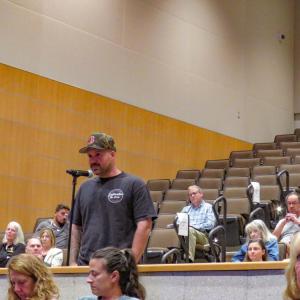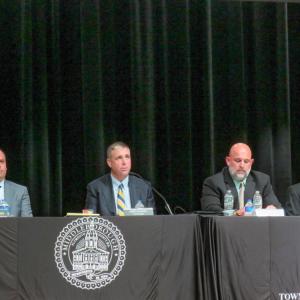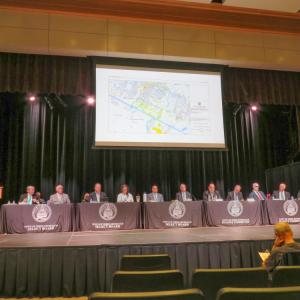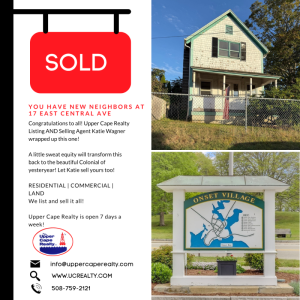School Committee expansion dominates Special Town Meeting discussion
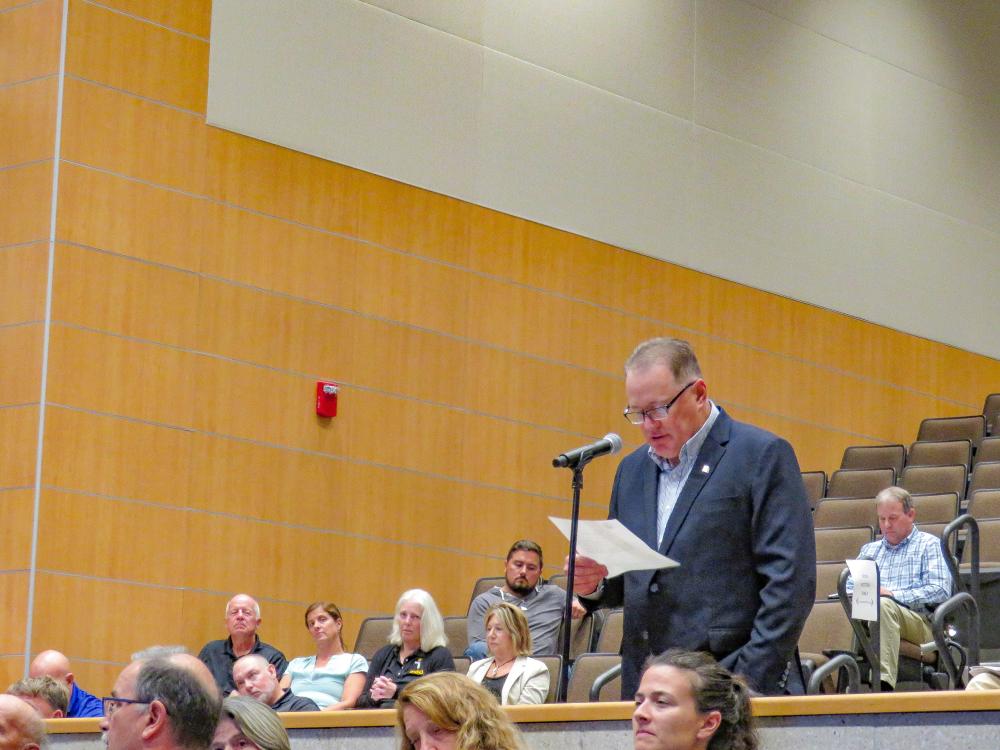 Select Board member Brian Giovanoni proposes an amendment to the school board article at the Special Town Meeting Oct. 6. Photos by Grace Roche
Select Board member Brian Giovanoni proposes an amendment to the school board article at the Special Town Meeting Oct. 6. Photos by Grace Roche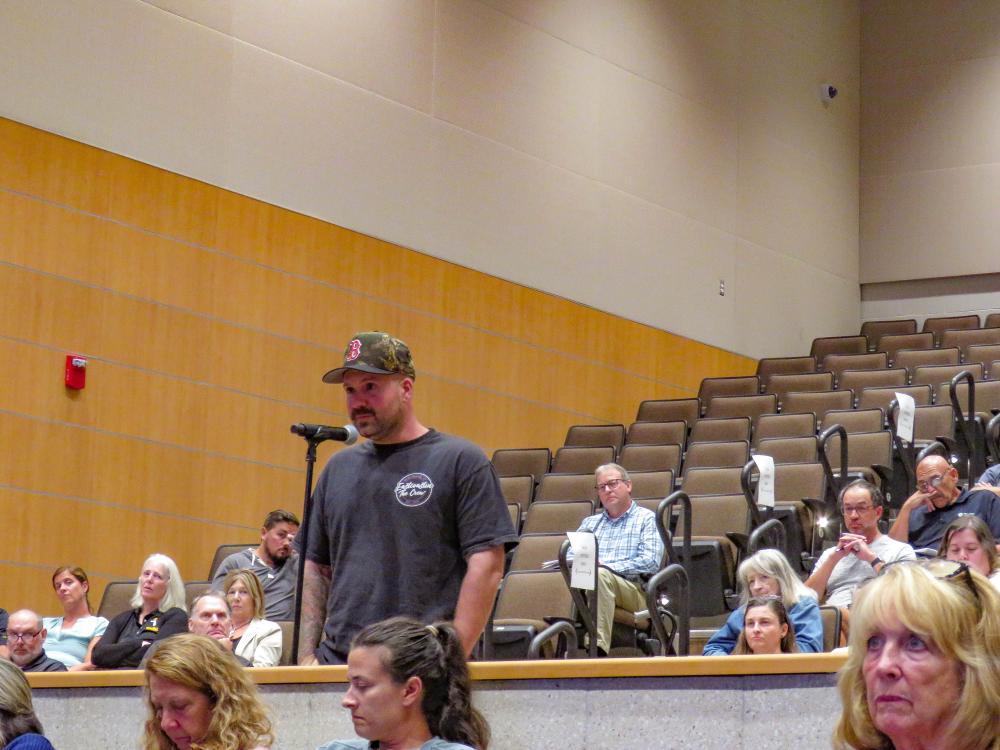 Josh Cummings speaks during the Special Town Meeting.
Josh Cummings speaks during the Special Town Meeting. 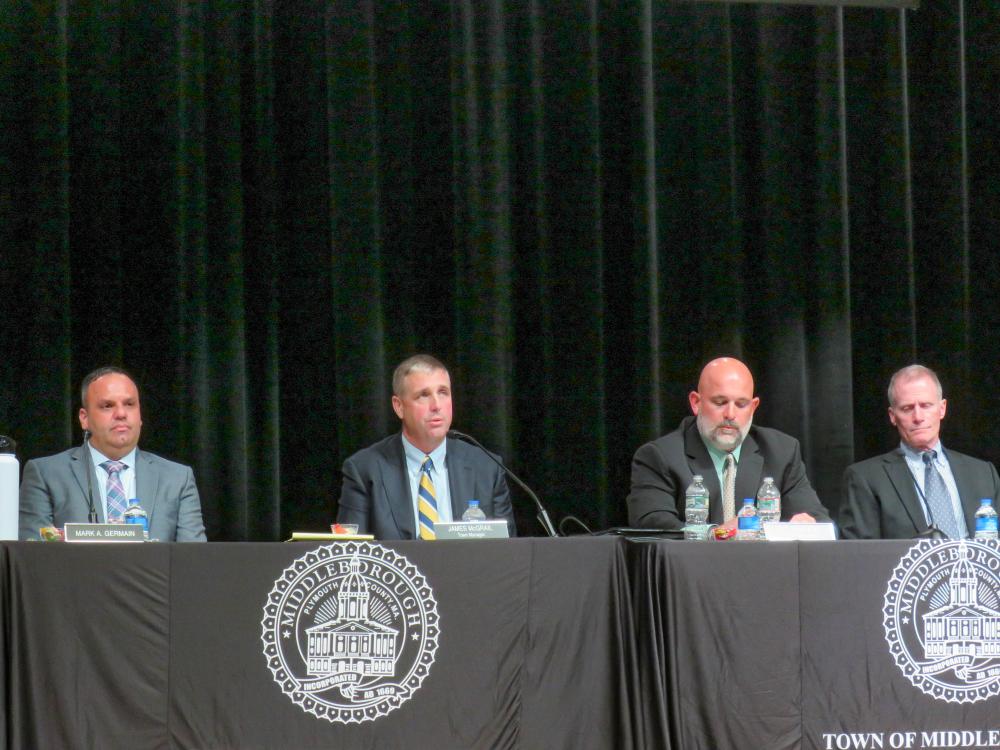 Members of the Select Board and Town Manager James McGrail at the Special Town Meeting.
Members of the Select Board and Town Manager James McGrail at the Special Town Meeting. 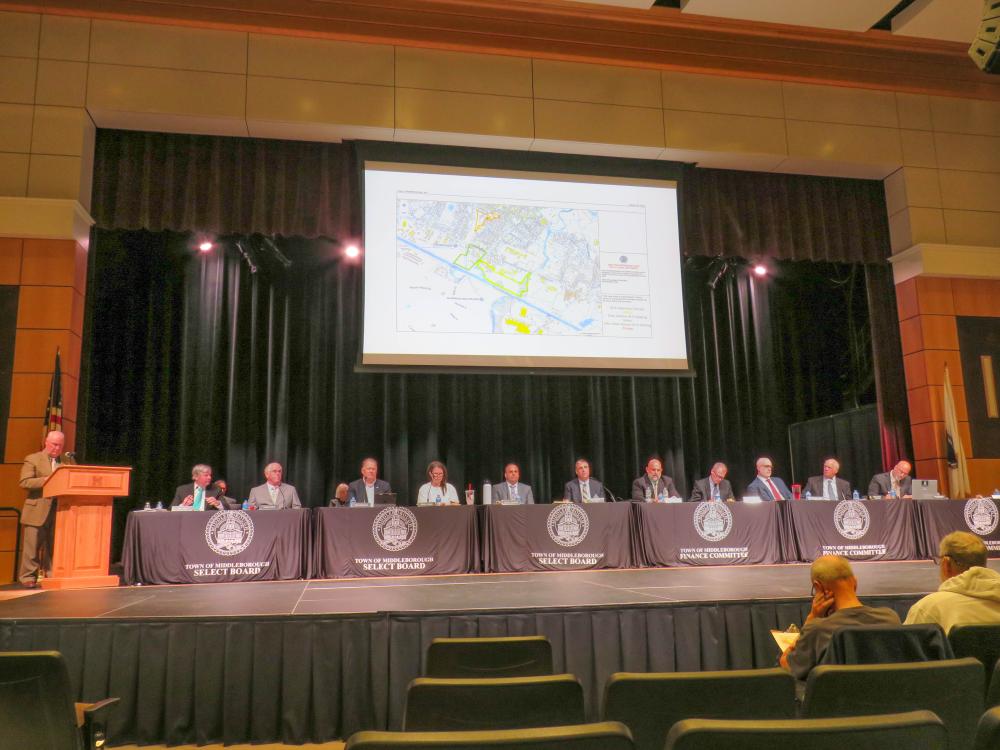 The meeting moderator, Select Board members and Finance Committee members on stage during the meeting.
The meeting moderator, Select Board members and Finance Committee members on stage during the meeting.  Select Board member Brian Giovanoni proposes an amendment to the school board article at the Special Town Meeting Oct. 6. Photos by Grace Roche
Select Board member Brian Giovanoni proposes an amendment to the school board article at the Special Town Meeting Oct. 6. Photos by Grace Roche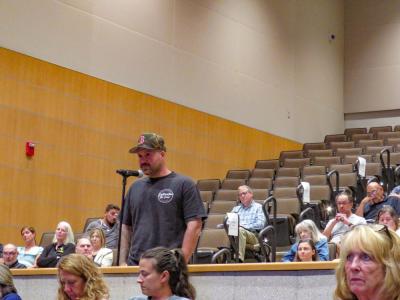 Josh Cummings speaks during the Special Town Meeting.
Josh Cummings speaks during the Special Town Meeting. 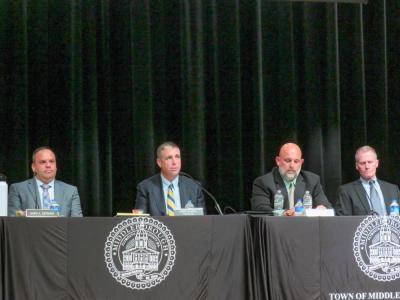 Members of the Select Board and Town Manager James McGrail at the Special Town Meeting.
Members of the Select Board and Town Manager James McGrail at the Special Town Meeting. 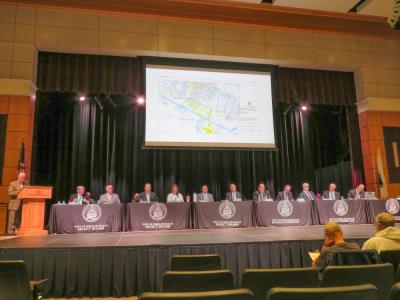 The meeting moderator, Select Board members and Finance Committee members on stage during the meeting.
The meeting moderator, Select Board members and Finance Committee members on stage during the meeting. MIDDLEBORO — Special Town Meeting filled the auditorium of Middleboro High School Sept. 6 to vote on several key agenda items, including an expanded school committee, an updated sewer map, a tax reduction for a company relocating to the town and a modified zoning map.
Discussion surrounding the number of School Committee members dominated public discussion Monday night.
An article proposed adding a seventh member to the committee, spurred by a monthlong split vote on nominating a committee chair. The article was intended to both expand the committee and introduce an odd number of members to prevent future ties.
Select Board member Brian Giovanoni addressed the meeting as a resident to propose an amendment to instead reduce the number of members to five.
“In my role as a Select Board member I did not vote in support of the seven, because I believe five is the correct number,” he said. “We have five members on the Select Board that are the executive members of the entire town. It’s something that can be done with five members.”
He added the committee only has four main responsibilities — selecting a superintendent, approving the district’s budget, setting policy and approving personnel additions.
While voters agreed an odd number of members was needed, there was debate on the ideal number.
Some voters, including Kevin Carey, favored Giovanoni’s five-person proposal.
Carey said he was hesitant to vote for a larger committee, as there would be more opinions at play. He said getting too many people involved in a decision makes things more complicated.
He also said more members should mean more representation, but that hearing directly from residents is more important.
“The whole representation — it falls upon the elected board themselves to actually open their ears and hear what the public says,” Carey said.
Former Select Board member Lincoln Andrews said a smaller committee is more accountable for the public, as it is easier to hide behind a greater number of members.
He also said it is easier to approach a smaller group for public comment, as public speaking can be intimidating for many people.
Other voters supported the original article and wanted to expand the committee.
Susan Pennini, vice chairperson of the school committee, said she and her fellow members do more work than Giovanoni might realize.
She pointed to the group’s work updating years-old school policies as a large and time-consuming project they are currently tasked with.
“I think you’re really underestimating the amount of work that is now being done on this board.” Pennini said.
“I really would ask for the support of the people on the stage as well as the people in the seats to help us in this way so we can get the work done that we’ve been charged with,” she added.
Kimberly Jones, the parent of a Middleboro High School student, said she also supported a seven-person committee.
“I agree that they have a lot of work to do,” Jones said. “I do believe we need more people in there and I believe we need a fresh set of eyes.”
In a 66 to 54 vote, Giovanoni’s amendment was defeated. However, the original motion passed by a large majority and a third seat will be up for election in 2026.
Articles to amend the town’s sewer service map, to offer a property tax reduction to a paving company and to expand the smart growth district all passed unanimously after further discussion.
Some residents were concerned approving sewer service to the Pilgrim Junction construction project would impact water use and cleanliness. Town Manager James McGrail clarified the project is already permitted and the only question up for vote was to allow the developer to connect to the sewage system.
“Our bottom line is, the town will be saving over $4 million, and it’s going to be at the contractor’s cost, so I think it’s something that is almost a no-brainer,” said Select Board member Bill Pike.
He said it is also beneficial that the waste will go into the town’s sewers instead of being dumped into the ground and likely polluting area wells.
Town Meeting also passed a “tax increment finance” agreement, also known as a TIF, to encourage indus, a paving company, to relocate its corporate headquarters to Middleboro after hearing from the Select Board and a current employee of the company.
Select Board member Thomas White said the company will boost economic activity, provide more taxable property and create jobs in the area. In particular, it will bring 120 vehicles the town can levy a motor vehicle excise on.
Andrews said he was concerned the company would not prioritize hiring Middleboro applicants. Several Select Board members said community and municipal pressure are needed to ensure the company maintains its agreement to hire town residents.
“I’ve just got to tell you, it’s a good company,” White said. “I have all my faith in them keeping their word.”
Josh Cummings, a Middleboro resident who has worked at the company for 16 years, said its relocation will benefit the town.
“They’re not just coming here to build, they want to give back,” he said. “They’re already shown interest in sponsoring kids' sports teams, supporting local programs, and even using work trucks to help out with parades and touch a truck events for kids.”
An expansion of the mixed-use development area downtown also unanimously passed.
The article was the result of a compromise between the town and the state to bring Middleboro into compliance with the Massachusetts Bay Transportation Authority Communities law requirements.
This expansion satisfies the requirements of the communities law while maintaining the town’s control over zoning.
When the MBTA denied the town’s previous overlay proposal, it said the map would not create additional housing units.
The new map passed by Town Meeting includes 61 acres of land, but only about 18 are buildable. The rest is unusable wetlands. Only about 300 units could be built in this area.
However, when administrators used the state’s compliance model, the town got credit for over 900 units. This means the town gets credit for 600 units that would be impossible to build due to wetland protection laws.
“We basically outsmarted the state at the end of the day,” said Select Board Chair Mark Germain.
A small group of voters opposed an article proposing all commercial buildings above 5,000 square feet must submit a site plan for the Planning Board to review. This modified law lowers the requirement from 20,000 square feet to give the board control over more construction in Middleboro.
The article required a two-thirds vote, and passed 112-16.
The rest of the articles on the warrant passed without discussion.
Fund transfers for retirement benefits, tax billing, public works and property value reassessment passed unanimously. An extension to an emergency water agreement with Carver was also approved.
The final article of the evening, a citizen petition to draft petition language for a water commission, was indefinitely tabled after a motion from its submitter Richard Oakley.
He said it was no longer needed after the Select Board agreed to create a charter review group to review Middleboro’s governing document and decide if the commission is the best course of action.


















